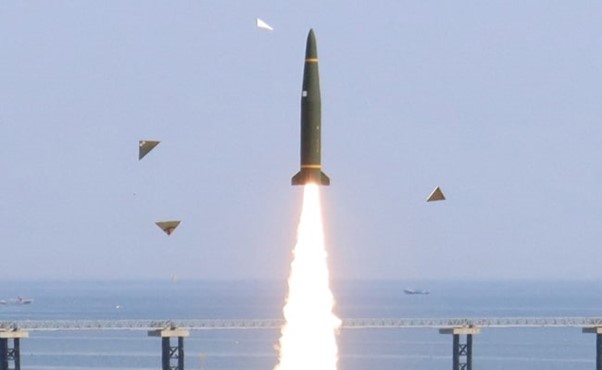| Translate This News In |
|---|
North Korea fired two ballistic missiles on Thursday, justifying its recent barrage of sanctions-busting tests as necessary countermeasures to US-South Korean military drills.
At a meeting of the UN Security Council to address Pyongyang’s firing of an intermediate-range ballistic missile over Japan on Tuesday, North Korea accused Washington of “escalating the military tensions on the Korean peninsula.”
The recent launches, six in less than two weeks, included the Korean People’s Army’s “just counteraction measures to South Korea-US joint drills,” according to Pyongyang’s foreign ministry.
The South Korean military said early Thursday that it had detected two short-range ballistic missiles launched from Pyongyang’s Samsok area towards the East Sea, also known as the Sea of Japan.
In a statement, the Joint Chiefs of Staff of South Korea claimed that their military had increased monitoring and surveillance and was keeping maximum readiness in collaboration with the United States.
The launch of two potential ballistic missiles has also been confirmed by Japan’s coastguard, with Prime Minister Fumio Kishida telling reporters that the recent testing spree was “unacceptable.”
Yasukazu Hamada, the minister of defence for Japan, reported that the first missile travelled around 350 kilometres (217 miles) at a maximum height of about 100 kilometres, while the second missile travelled about 800 kilometres at a maximum altitude of about 50 kilometres.
The frequent launching of ballistic missiles by North Korea are intolerable, Hamada told reporters, regardless of their intended purpose.
“We cannot overlook its significant advancement in missile technology.”
– China criticises the United States –
Pyongyang’s Tuesday launch of what officials and analysts said was a Hwasong-12 missile, which travelled the longest horizontal distance of any North Korean test, prompted the US to request an emergency Security Council meeting.
At the meeting, North Korea’s long-time ally and economic backer Beijing also blamed Washington for provoking Kim Jong Un’s regime’s spate of launches.
North Korea’s recent launches, according to Geng Shuang, were “closely related” to military exercises in the region conducted by the US and its allies.
The United States, according to Geng, is “poisoning the regional security environment.”
In recent weeks, Seoul, Tokyo, and Washington have increased joint military exercises, including large-scale naval manoeuvres and anti-submarine drills.
The US announced Wednesday that the nuclear-powered USS Ronald Reagan would be redeployed to the Korean Peninsula for a second visit in less than a month.
With the deployment of the aircraft carrier, the US, according to North Korea’s foreign ministry, is “posing a serious threat to the stability of the situation on the Korean peninsula.”
– More penalties?
The barrage of launches is part of a record year of nuclear tests by isolated North Korea, which leader Kim Jong Un has declared a “irreversible” nuclear power, effectively ruling out the possibility of denuclearisation talks.
US Ambassador to the UN Linda Thomas-Greenfield called for “strengthening” existing sanctions against North Korea, which China and Russia vetoed in May.
For months, the council has been split on how to respond to Pyongyang’s nuclear ambitions, with Russia and China on the sympathetic side and the rest of the council pushing for punishment.
Analysts believe Pyongyang has taken advantage of the UN stalemate to conduct increasingly provocative weapons tests.
For months, officials in Seoul and Washington have warned that Pyongyang will conduct another nuclear test, most likely after the Chinese Party Congress on October 16.
“At this point, Kim turning back and halting provocations would appear counterproductive to his interests,” Soo Kim, an analyst at the RAND Corporation, told AFP.
“In fact, we are in the middle of a cycle of provocations involving weapons. All that is left is an ICBM test and possibly the seventh nuclear test that has been eagerly anticipated.”


















